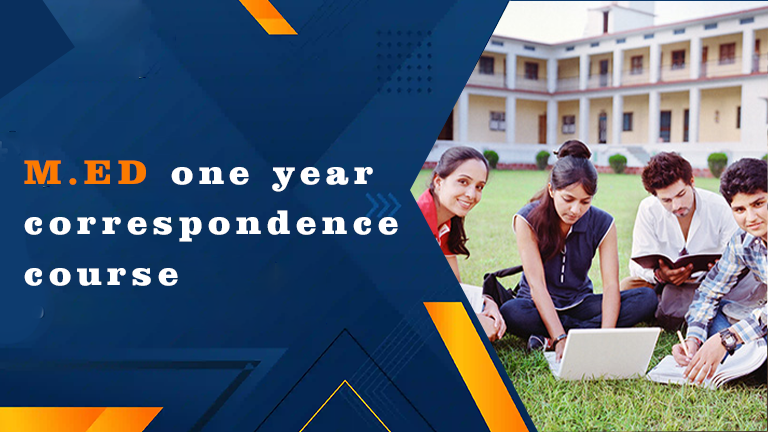
Arrange a Callback
M.ED one year correspondence course
Unlocking Your Potential The M.Ed One-Year Correspondence Course. In today’s fast-paced world, continuing education has become more essential than ever for professionals looking to advance their careers and deepen their expertise. If you’re passionate about education and want to elevate your credentials, the Master of Education (M.Ed) one-year correspondence course might be just what you need. Let’s explore how this flexible and convenient program can be the key to unlocking new opportunities in your educational journey.
What is an M.Ed One-Year Correspondence Course?
An M.Ed one-year correspondence course is a postgraduate program designed for educators and professionals in the field of education. Unlike traditional full-time programs, this course allows you to study from the comfort of your own home, balancing your studies with your existing commitments. The program is typically completed in one year, making it a time-efficient option for those looking to enhance their qualifications without taking a career break.
Why Choose a One-Year Correspondence Course?
- Flexibility – One of the most significant advantages of a correspondence course is its flexibility. You can study at your own pace and on your own schedule, which is ideal for busy professionals who need to juggle work, family, and other responsibilities. The correspondence format means you can access study materials, assignments, and lectures online, allowing you to learn from anywhere.
- Time Efficiency – Traditional M.Ed programs often take two years to complete, but the one-year correspondence course is designed for those who want to expedite their education. This condensed format is perfect for individuals eager to advance their careers quickly without compromising the quality of their education.
- Cost-Effective — Correspondence courses can be more affordable than their full-time counterparts. With fewer overheads and the absence of campus facilities, the cost savings are often passed on to the students. This makes it a cost-effective way to gain a prestigious degree without breaking the bank.
- Customized Learning Experience — With correspondence courses, you often have more control over your learning process. You can revisit materials as needed, and many programs offer a range of resources like e-books, recorded lectures, and discussion forums to enhance your learning experience.
What Will You Learn?
The curriculum of an M.Ed one-year correspondence course typically covers a broad range of topics related to education. Here’s a glimpse of what you might encounter:
– Educational Psychology: Understanding how students learn and develop, and how to apply psychological principles to teaching.
– Curriculum and Instruction: Designing and implementing effective curricula and teaching strategies.
– Educational Research: Conducting research to improve educational practices and outcomes.
– Leadership and Management: Developing skills to lead educational institutions and manage educational programs effectively.
– Special Education: Strategies for teaching students with diverse needs and creating inclusive learning environments.
Each module is designed to build upon your existing knowledge and help you apply theoretical concepts to practical scenarios.
Read More:— Med Lab Tech Program
How Does it Work?
- Enrollment: Start by researching accredited institutions that offer M.Ed one-year correspondence courses. Look for programs with a strong reputation and positive reviews from past students.
- Study Materials: Once enrolled, you’ll receive access to a range of study materials, including textbooks, online lectures, and assignment guidelines. These materials are designed to provide you with a comprehensive understanding of each subject.
- Assignments and Exams: Throughout the course, you’ll complete assignments and exams to assess your understanding. Deadlines for assignments are usually flexible, allowing you to manage your workload effectively.
- Support and Guidance: Many correspondence courses offer support through online forums, virtual office hours, and access to academic advisors. This support ensures that you’re never alone in your studies and can get help whenever you need it.
Career Prospects After Completing the Course
An M.Ed degree opens up numerous career opportunities. Graduates often pursue roles such as:
– Educational Consultant: Providing expert advice to schools and educational institutions.
– Curriculum Developer: Designing and implementing educational programs and materials.
– School Administrator: Managing and leading educational institutions.
– Special Education Specialist: Working with students with special needs to ensure they receive appropriate educational support.
Additionally, having an M.Ed can make you a more competitive candidate for promotions within your current role and increase your earning potential.
Tips for Success
- Stay Organized: Keep track of your study schedule, assignment deadlines, and exam dates. Use planners or digital tools to stay on top of your coursework.
- Engage Actively: Participate in online discussions and seek feedback from peers and instructors to enhance your understanding of the material.
- Balance Your Time: Find a study routine that works for you and ensures a balance between your personal and professional life.
- Seek Support: Don’t hesitate to reach out for help if you’re struggling with any aspect of the course. Utilize the resources and support systems provided by your institution.
Conclusion
The M.Ed one-year correspondence course is an excellent choice for educators and professionals who want to advance their careers without disrupting their current commitments. With its flexibility, cost-effectiveness, and comprehensive curriculum, this program offers a valuable opportunity to deepen your knowledge and enhance your professional skills. By choosing a correspondence course, You can choose M.Ed College in Haryana and you’re taking a significant step toward achieving your career goals and making a positive impact in the field of education.


